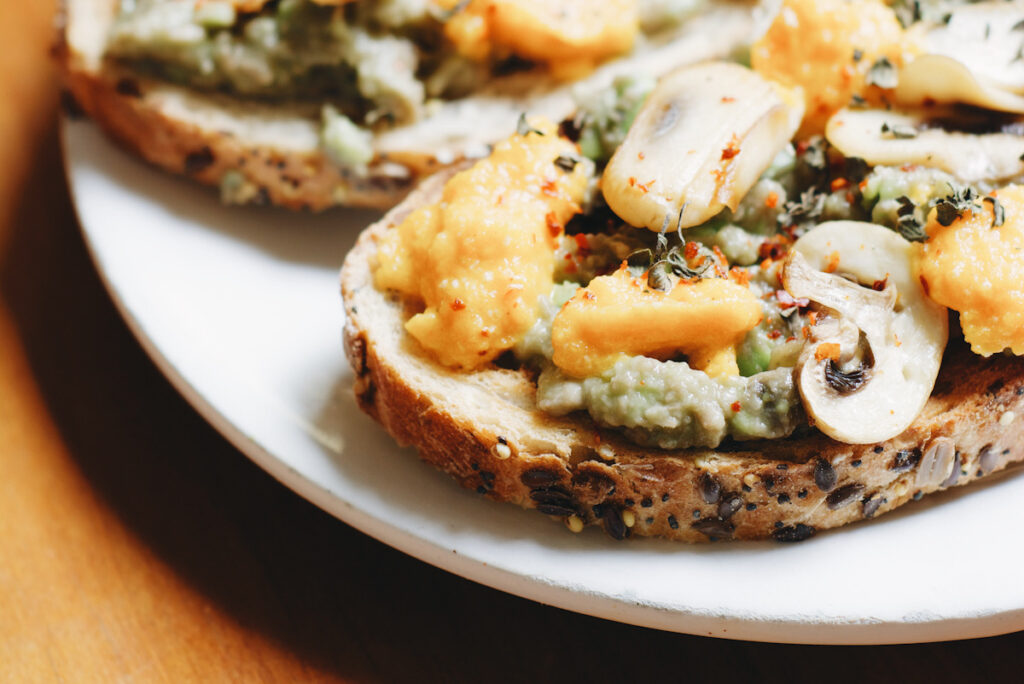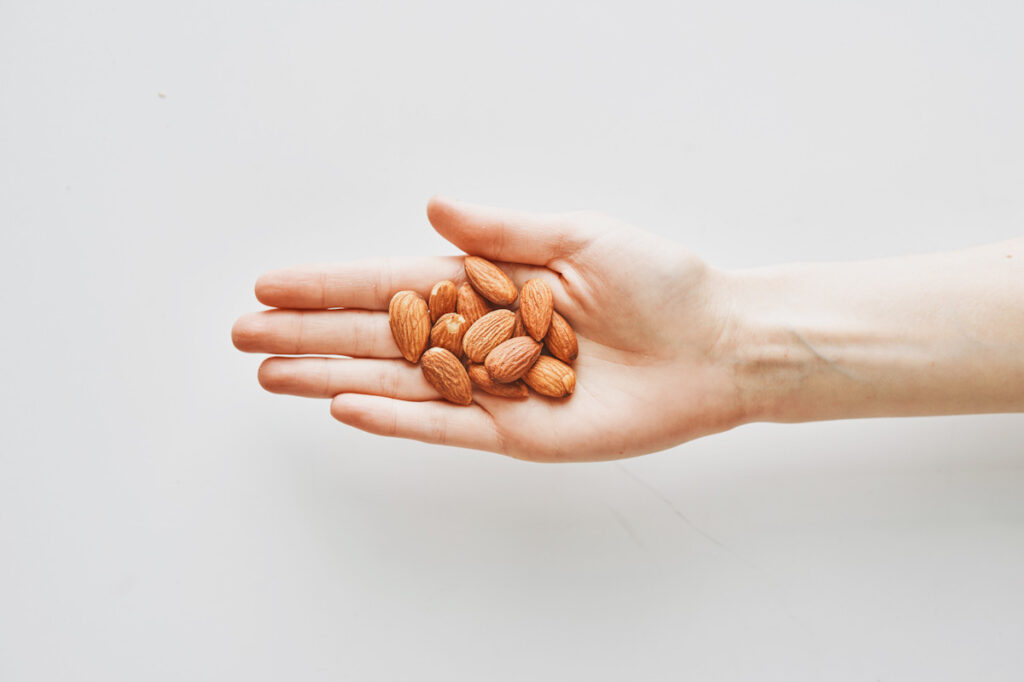There are plenty of myths surrounding a plant-based diet, but a growing body of evidence shows that vegan food can be diverse, nutrient-dense, and healthy. These are some of the most common misconceptions about a plant-based diet and vegan nutrition debunked once and for all.

A Plant-Based Diet Is Restrictive
What can you eat on a plant-based diet? In short, almost anything. Meat-based recipes are adaptable, and many use whole plants as replacements for animal products.
Mushrooms, jackfruit, legumes, and pulses are all popular plant alternatives to meat. With careful seasoning and preparation, these whole foods can replace bacon, pulled pork, beef, mincemeat, and more. Beans and lentils are ideal ingredients for curries and stews. They are extremely high in protein and fiber, low in fat, and a healthy source of B vitamins.
Fiber and nutrient-dense foods—like pulses, and cruciferous vegetables—are also some of the most versatile. They can be eaten as they are, or incorporated into traditionally meat-based foods like lasagna, burgers, and stews. In addition to whole foods, there are also plenty of ready-made versions of animal foods. These alternatives range from breadcrumbed tofu chunks to hyper-realistic vegan beef patties.
Thanks to the recent boom in vegan products, ready-made plant-based alternatives, including milk, cheese, and meat, are even more widely available than ever before. Plant-based meat is particularly popular with consumers—including meat-eaters, vegans, vegetarians, and flexitarians.
Vegan meats are not just for those who totally abstain from animal products. According to Nielsen data, 98 percent of consumers who regularly buy meat-alternatives also purchase conventional meat.

Plant-Based Food Isn’t Healthy
The government recommendation of five portions of fruit and vegetables per day is familiar to most people. In the UK, the recommendation is now ten portions per day. However, research commissioned by Dole Packaged Foods Europe reported that just 75 percent of Brits managed to reach five portions. Additionally, nearly 50 percent regularly fail to consume any fresh produce at all. There is a growing body of evidence that suggests if people do manage to consume fresh produce, it can have a significant impact on their health.
According to a study review conducted by Imperial College London and reported by the BBC, consuming just 200g—approximately three daily portions—of fresh fruit and vegetables could reduce health risks. The risk of cardiovascular disease could be reduced by 13 percent, risk of cancer by 4 percent, and risk of premature death by 15 percent.
When consuming the recommended ten portions, the risk was mitigated by 28, 13 and 31 percent respectively. According to PCRM (Physicians Committee for Responsible Medicine), a doctor-led nonprofit organization, the plant-based diet as the healthiest choice.

A Plant-Based Diet Isn’t Suitable for Children
The raising of children on a vegan diet can be a controversial subject. But once again, a growing body of evidence suggests that a well-planned, nutritious plant-based diet can meet the nutritional requirements for people of all ages.
A 2018 article published by the National Center for Biotechnology Information (NCBI) and titled “Vegan Nutrition for Mothers and Children: Practical Tools for Healthcare Providers” says: “Vegan diets can meet nutrient requirements and can be an appropriate choice for all life stages, including pregnancy, lactation, infancy, and childhood, provided that they are well-planned.”
Several plant-based celebrities and well-known vegans have discussed the raising of plant-based families. “Keeping Up With the Kardashians” star Kim Kardashian West is raising her four children on a mostly-plant-based diet. The star also recently shared a photograph of her refrigerator, which included Beyond Meat products and plenty of fresh produce.
A growing number of schools are now offering students meatless meals in an effort to both mitigate climate change and improve student health. New York City’s public schools all offer meatless-Monday menus, while the Los Angeles school district is also exploring plant-based options. Dedicated vegan schools like the Calabasas, California MUSE school are fully vegan.
The Physician’s Committee for Responsible Medicine provides nutritional advice tailored to different age groups. In general, PCRM says that the benefits that adults experience from adopting a vegan diet also apply to children and young people.

You’ll Be Deficient in B12
Vitamin B12 is an essential part of a healthy diet, and it keeps the nerve and blood cells healthy. Deficiency is serious and can cause anemia, memory loss, and fatigue. B12 is synthesized by soil bacteria and is almost exclusively present in animal products.
According to Dr. Michael Greger, the founder of NutritionFacts.org and author of the best-selling “How Not to Die” (2015), B12 is critical to any healthy diet. The Dietary Guidelines for Americans suggest meeting nutritional needs through food, where possible, including fortified items.
Fortified plant-based products such as nutritional yeast, cereals, and vegan milk are all good sources of B12. However, Dr. Greger suggests that taking a B12 supplement is the most efficient way to ensure a healthy dose. The NCBI suggests that all vegans—and those following a primarily plant-based diet—take supplementary B12 in addition to healthy foods.
Recently, scientists discovered a source of bioactive vegan B12 in water lentils. The aquatic plants, also known as duckweed, grow in bodies of still freshwater. Florida-based startup Parabel has created a water lentil-based powder called Lentein that contains approximately 750 percent of the RDA of B12. The company plans to produce plant-based milk that will also be high in B12.

Plant-Based Food Is Low in Calcium
Calcium is important for bone health, heartbeat regulation, and effective blood clotting. Deficiency is particularly common in menopausal and post-menopausal women. This is why the RDA is higher for people who have had periods aged 50 and above—from 1,000 milligrams to 1,200 milligrams.
“Every day, we lose calcium through our skin, nails, hair, sweat, urine, and feces,” says the National Osteoporosis Foundation (NOF). “That’s why it’s important to get enough calcium from the food we eat. When we don’t get the calcium our body needs, it is taken from our bones. This is fine once in a while, but if it happens too often, bones get weak and easier to break.”
“Calcium requirements can be met in a vegan diet by choosing plant foods rich in calcium,” says NCIB. “These include most green leafy vegetables low in oxalates, cruciferous vegetables, sesame seeds, almonds, fortified plant-based milks and plant-based yoghurts, soy, tempeh, calcium-set tofu, and dried figs.”
According to PCRM, dark leafy greens and legumes are among the healthiest sources for calcium. Soybeans, including soya milk and tofu, are a good source of calcium. PCRM says that half a cup of calcium-set tofu can contain up to 861 milligrams of the mineral. According to Healthline, almonds have the highest calcium content of all nuts.
Calcium is also not the only essential mineral for healthy bones. And ensuring B12 and vitamin D intake is optimal will also positively affect bone mineralization.

A Plant-Based Diet Is Low in Iron
In general, myths concerning vitamin deficiencies on a plant-based diet are commonplace. But the reality is that anyone can experience deficiencies if they are not following a complete, well-rounded diet.
In the UK, the National Health Service (NHS) has previously said that malnutrition affects millions of people. According to the Centers for Disease Control and Prevention, almost 10 percent of Americans have a nutritional deficiency.
Iron deficiency is the most prevalent nutritional deficiency, and it affects more than 25 percent of people worldwide. Extreme iron deficiency can cause anemia, which can lead to other related health issues such as heart conditions, and impact pregnancy and child development.
Absorption levels can vary, even for those consuming plenty of iron-rich foods. Soil erosion and rising C02 levels have actually reduced the density of minerals and vitamins in certain produce. And intensive agricultural methods have reduced the nutritional value of many foods.
According to NCIB, a well-rounded plant-based diet is typically higher in iron than that of an ovo-lacto vegetarian or meat-eater. Lentils, cannellini beans, potatoes, tofu, spinach, and hemp seeds are all rich in iron. Once again, supplements are a useful way for people of all diets and lifestyles to boost their levels.

You Won’t Get Enough Protein
A plant-based diet can contain more than enough protein, including for people with active lifestyles. Pulses, legumes, nuts, green peas, and even broccoli contain healthy protein. Broccoli also contains vitamin C and zinc—both of which can bolster your immune system.
Dark green vegetables, including kale and spinach, contain even more protein than broccoli. And one cup of kale contains approximately 2.5g of protein. Pulses like chickpeas and other beans are particularly effective when combined with whole grains.
“A 100-gram serving of cooked chickpeas provided 18 percent of the daily value for protein, 30 percent of the daily fiber, 43 percent of the daily folate intake, and 52 percent of the trace mineral manganese,” plant-based cardiologist Dr. Joel Kahn writes for LIVEKINDLY.
Tofu, tempeh, edamame, and other soy products are all high in protein. Fortified soya milk is also a great source of protein, especially when consumed regularly throughout the day. Fermented soy products, including tempeh, are particularly nutritions and promote healthy gut bacteria.
The popular 2019 documentary “The Game Changers” focused on the benefits of plant-based protein for high-performance athletes. Martial artist and special forces trainer James Wilks is filmed as he discusses performance and diet with other athletes. According to Wilks, many people are adopting plant-based and plant-forward diets for better nutrition.

Plant-Based Is Expensive
Despite the inherent privilege of choice, adopting a vegan diet can be extremely affordable. Depending on location, many of the core ingredients needed to maintain a healthy, well-balanced diet are available at a low cost. Products such as legumes, pulses, and grains, can all often be purchased dried and in bulk.
Fresh fruit and veg, depending again on location and availability, can also be relatively affordable. Seasonal produce, particularly when compared with fresh meat, can often be purchased at a lower cost. It will contain more nutrients—and have a lower carbon footprint—than unseasonal produce.
Supply and demand dictate the price of modern, luxury vegan products such as milk and cheese. While some of these are still relatively expensive, many have become more accessible as demand has grown in the last year. Various supermarkets are providing more own-brand and private label options, and certain companies are tailoring lines specifically for their affordability.
When vegan producers are more present in the global meat market, the cost of production and the cost of purchase will both go down. According to Liz Specht Ph.D., a senior scientist at the Good Food Institute (GFI), price parity between vegan meat and animal-based meat could be coming soon.
“Industrial animal agriculture has been operating and optimizing at a global scale for decades,” Specht explained in a post on GFI’s website. “Yet it is still inherently more efficient to make meat directly from plants rather than feeding our crops to animals and then eating a part of the animal.”

Plants Aren’t Suitable for Animals
According to research gathered by American animal food producer Hill’s Pet, dogs possess more omnivorous traits than carnivorous ones. Much like humans, this means that dogs can eat meat-free food and live in good health.
There are also many risks associated specifically with animal-based pet food. Wild Earth, a 100 percent vegan company, says that many major dog food brands use meat from dead, dying, diseased, and disabled animals. Some dog food products have even been found to contain pentobarbital, a drug used to euthanize livestock.
In contrast, nutritionally sound, plant-based animal food can be beneficial to animal health. According to a study published in the online journal Plos One, 35 percent of owners with meat-eating animal companions were interested in switching them to a vegan diet.
“Every day there is new information about the link between a plant-based diet and disease prevention,” said Kathy Kramer, Medical Director at Vancouver Animal Wellness, on plant-based dog food brand Virchew’s website. “Why would it not be the same for our beloved dogs who are prone to many of the same diseases?”
Studies also show that animal-based pet food has the same impact on the planet as other animal products. According to research also published by Plos One, pet food is estimated to make up around 25 percent of the overall environmental impact of meat production.


